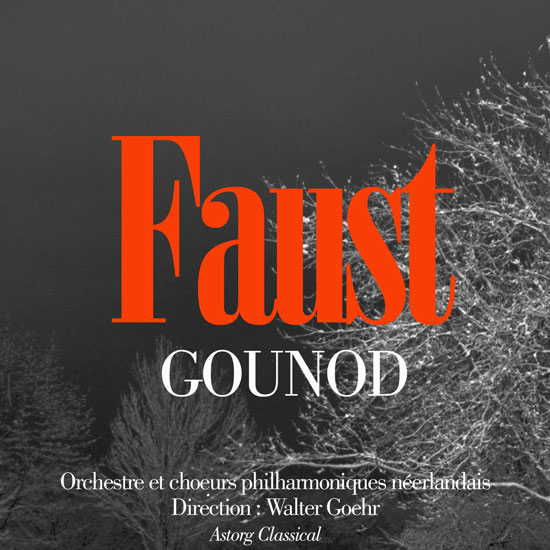
Overview
Synopsis
Faust, an aging scholar, has devoted his life to studying. As he reflects on his life, he feels that nothing has come of his devotion. He contemplates suicide and, as he is about to do so, he curses God and asks the devil to appear. Mephistopheles, the devil, appears and tempts Faust with an image of a lovely young woman, Marguerite, and Faust makes a deal with the devil. The deal will make Faust young again, as the devil will give Faust life on earth and, in return, Faust must spend eternity with Mephistopheles in Hell. Faust lusts after Marguerite and eventually wins her over. His thirst for youth has left him with little care of the consequences others will face. Marguerite becomes pregnant, causing her brother, Valentin, to challenge Faust to a duel. Faust, with Mephistopheles’ help, ends up killing Valentin. Marguerite later kills her child and is imprisoned. Faust is let into the prison by Mephistopheles and the two men tell Marguerite they will get her out. Marguerite, however, tells them she would prefer her fate to be in the hands of God. Her faith eventually saves her and she ascends to heaven. With all its controversial moments, Faust, is one of the most loved, and most upsetting operas. With the struggle between religion, moral value, and sin, its story is intensely theatrical. While many versions of the story have made appearances on stage, Gounod’s music best captures all the different colors, emotions, and points of view shared in this miraculous story.
Show Information
- Music
- Charles Gounod
- Lyrics
- Jules Barbier
- Based On Book By
- Johann Wolfgang Goethe
- Based on the Play/Book/Film
- Johann Wolfgang Goethe
- Category
- Opera
- Age Guidance
- Youth (Y)/General Audiences (G)
- Number of Acts
- 5
- First Produced
- 1859
- Genres
- Drama
- Settings
- Multiple Settings
- Time & Place
- germany, 16th century
- Cast Size
- medium
- Orchestra Size
- Large
- Dancing
- Some Dance
- Ideal For
- College/University, Professional Opera, Mostly Male Cast, Includes Adult, Mature Adult, Young Adult, Late Teen Characters, Medium Cast
Context
Plot
Characters
| Name | Part Size | Gender | Vocal Part |
|---|---|---|---|
|
Lead |
Male |
Bass |
|
|
Lead |
Male |
Tenor |
|
|
Lead |
Female |
Soprano |
|
|
Supporting |
Male |
Baritone |
|
|
Supporting |
Male |
Baritone |
|
|
Supporting |
Male |
Mezzo-Soprano |
|
|
Supporting |
Female |
Mezzo-Soprano |
|
|
Ensemble |
Either Gender |
Soprano, Mezzo-Soprano, Alto, Tenor, Baritone, Bass |
Songs
- ACT 1
- Scene and Chorus - Rien! En vain j’interroge (Faust, Chorus)
- Scene and Duet - Mais ce Dieu (Faust, Mephistopheles)
- ACT 2
- Grand Chorus - Vin ou bière (Chorus)
- Aria, Recitative, and Cavatina - O sainte médaille...Avant de quitter ces lieux (Valentin, Wagner, Chorus)
- Aria - Le veau d’or (Mephistopheles, Chorus)
- Scene and Chorus - Merci de ta chanson! (Wagner, Valentin, Siebel, Mephistopheles, Chorus)
- Chorus - De l’enfer qui vient (Chorus)
- Waltz and Chorus - Ainsi que la brise légerère (Chorus)
- ACT 3
- Aria - Faites-lui mes aveux (Siebel)
- Aria - Salut! Demeure chaste et pure (Faust)
- Aria - Ah! Je ris de me voir si belle (Marguerite)
- Scene and Quartet - Seigneur Dieu, que vois-je! (Marguerite, Martha, Mephistopheles, Faust)
- Duet - Il se fait tard, adieu! (Marguerite, Faust)
- ACT 4
- Entracte and Recit. - Elle ne sont plus là (Marguerite, Chorus)
- Scene - Elles se cachaient! Ah! Cruelles! (Marguerite, Siebel)
- Scene - Seigneur, daignez permettre à vottre humble servante (Marguerite, Mephistopheles, Chorus)
- Chorus of Soldiers - Déposons les armes (Chorus, Siebe, Valentin)
- Scene and Serenade - Qu’attedez vous encore? (Mephistopheles, Faust
- Serenade - Vous qui faites (Mephistopheles)
- Trio - Que voulez-vous, messieurs? (Valentin, Mephistopheles, Faust
- Death of Valentin - Par ici, par ici, mes amis! (Siebel, Marthe, Chorus, Valentin, Marguerite)
- ACT 5
- Scene - Walpurgis Nacht - Dans les bruyères (Chorus, Faust, Mephistopheles
- Trio and Finale - Vaten! Le jour va luire (Faust, Méphistophélès, Marguerite, Chorus)
A song with an asterisk (*) before the title indicates a dance number; a character listed in a song with an asterisk (*) by the character's name indicates that the character exclusively serves as a dancer in this song, which is sung by other characters.
Monologues
Scenes
Key Terms
Sorry! We do not currently have terms for this guide.
Videos
Quizzes
Themes, Symbols & Motifs
Sorry! We do not currently have learning modules for this guide.
Quote Analysis
Sorry! We do not currently have learning modules for this guide.
